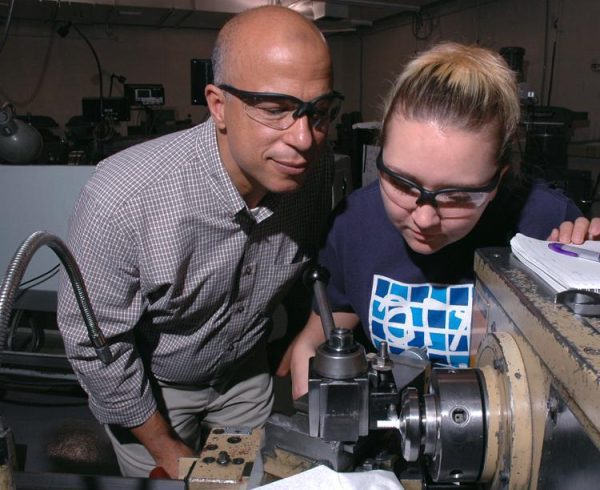Center for Biomedical Engineering Systems

Established in 2005, CBES is led by Director Robin Coger, who is a professor in the Mechanical Engineering and Engineering Science Department. “By the very nature of our field,” Dr. Coger said, “successes in biomedical engineering require collaborative efforts from multiple disciplines. It is simply not possible for an individual researcher to garner the full expertise needed to solve the complex problems of biomedical research and development.”
The CBES team consists of 40 affiliated members including researchers from four UNC Charlotte colleges (Lee College of Engineering, Liberal Arts and Sciences, Health and Human Services, and Computing and Informatics), as well as clinicians and clinical researchers of Carolinas Medical Center, Orthocarolina, and Presbyterian Hospital.
Because the field of biomedical engineering is broad, CBES is organized into focus areas designed to build community and discussion between persons with complementary interests. Since its establishment, the center has continued to evolve these focus areas in response to the needs and interests of its researchers. The three focus areas of CBES are Medical Therapies and Technologies, Biomechanics and Mobility Research, and Molecular Engineering and Design.
“Our field is an extremely dynamic one, in part because it progresses on the interfaces between traditional fields,” Dr. Coger said. “In this newsletter, several of the exciting endeavors of CBES researchers within the College of Engineering are featured. To that I can also add the work of others in the college, such as Dr. Bharat Joshi of the Electrical and Computer Engineering Department, who is helping to improve the reliability of clinical diagnostic equipment such as EEGs. Yet it is important to emphasize that there are also a host of projects anchored by CBES researchers outside of this college.
“What is critical to our center’s success is an appreciation of the value of effective collaborations — ranging from engineers working with biologists and kinesiologists, to physicists working with mathematicians, to clinicians working with visualization specialists – in finding novel approaches and solutions. Our efforts throughout the first phase of our center’s existence have consistently focused on helping to foster these research connections (see http://cbes.uncc.edu/news/news1.pdf for one upcoming example of this).”
According to UNC Charlotte’s Office of Research Services’ records – the funding of CBES’ on-campus researchers has increased from $541K in the center’s first year, to over $1.6million for the 2008/2009 fiscal year. “While ORS’s records reflect on-campus research statistics, our center’s records indicate that the annual research dollars being secured by the total body of CBES Researchers is significantly higher. Those projects are key to establishing the foundation vital for CBES securing larger program funds from federal agencies in our next phase of growth.”
It is clear that the Center for Biomedical Engineering Systems is an important example of a campus unit that successfully synergizes interdisciplinary expertise to aid the university in its research goals. “Biomedical engineering is a key part of the biotechnology/healthcare arena, which is rapidly expanding in North Carolina and throughout the country. The exciting contributions of our CBES researchers ensure that this region is well represented.”
For more information about CBES contact CBES’ business manager Marvaleeta Blye at mmblye@uncc.edu, or visit the Center’s website CBES.uncc.edu.